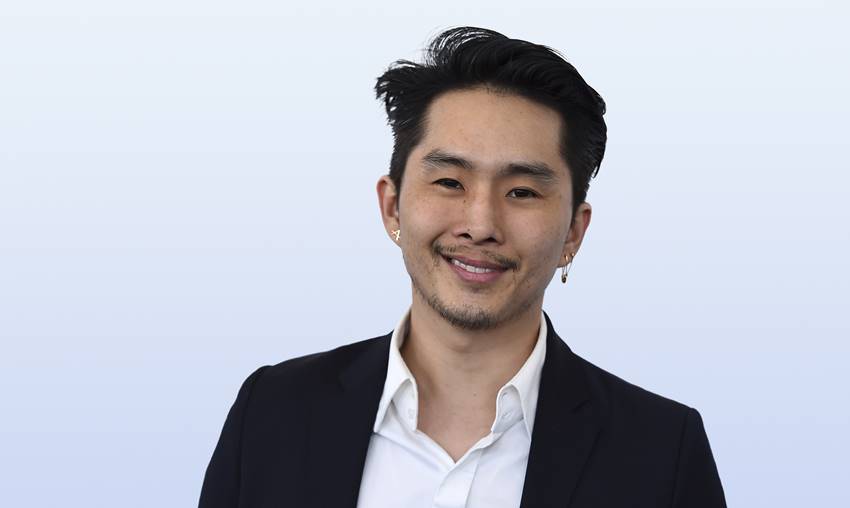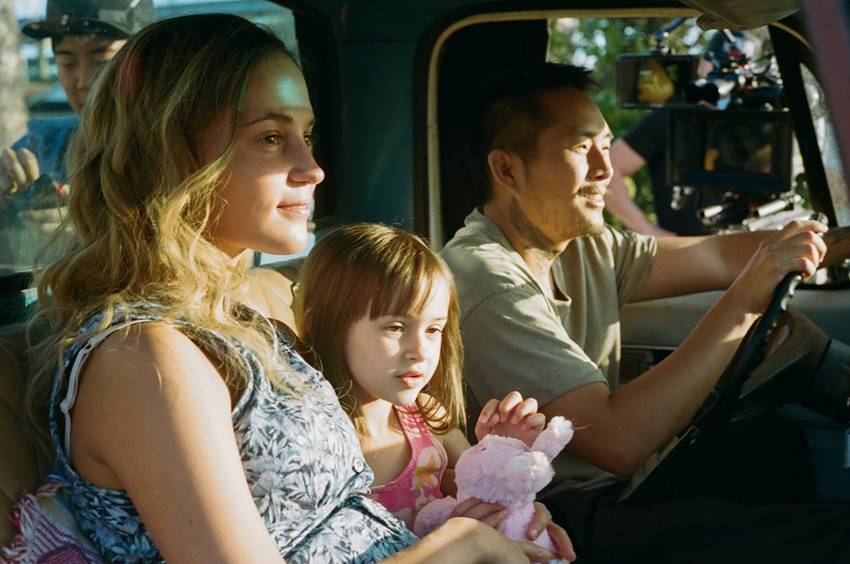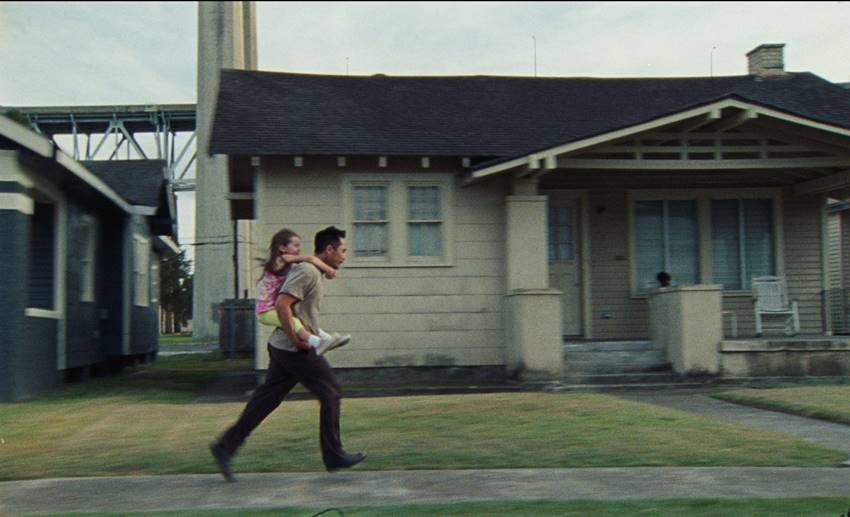
By Jae-Ha Kim
Teen Vogue
September 20, 2021
You’ll likely recognize Justin Chon from one of his numerous film roles in the Twilight series, the Disney Channel Original Movie Wendy Wu: Homecoming Warrior, and more. In the years since those projects, however, he’s added filmmaker to his extensive resumé. His latest film, Blue Bayou, tackles adoption, immigration, and poverty — and what it means to be an American.
Justin – who wrote and directed the film – stars as Antonio LeBlanc, a 30something man trying to earn enough money to support his family. He loves his pregnant wife, Kathy (played by Academy Award winner Alicia Vikander), and dotes on her daughter, Jessie. After an altercation with Kathy’s cop ex-husband, Antonio is hauled off to jail. What should’ve been a few-hours lockup turns into a nightmare for the LeBlancs. His adoptive parents had never applied for his U.S. citizenship. So in the eyes of the government, Antonio is an illegal immigrant who may be deported back to South Korea.
The storyline may sound melodramatic enough that viewers could be excused for thinking this is a work of fiction. But while Antonio is a figment of Justin’s imagination, Blue Bayou is based on the very real adoptees who were brought to the United States as babies and deported as adults after being convicted of crimes.
Teen Vogue spoke to Justin via Zoom a few days before Blue Bayou’s September 17 opening. The actor, who also sings a Korean lullaby at the close of the film, was candid about what he hopes to accomplish as a filmmaker.
Teen Vogue: Some Asian American artists have said they felt they wouldn’t find work in the United States, so they moved to Asian countries to launch their careers. Were you ever tempted to do the same?
Justin Chon: In the U.S., I’ve heard the where are you from question my whole life. But when I got to Korea, they always expressed to me very clearly that I’m not Korean. I’m American. There have been opportunities or things that have been brought up to work in Korea. But, no, I never thought of moving, because apart from what other people may believe, I’m an American. I want to make my art here. This is my home. And this is where I’d like to tell stories. My experiences have been in this country. I’m who I am because I was born and raised here. So for me, personally, I never thought of going to Korea and making a living there, no matter how hard it is here.
TV: What was it like trying to get roles early in your career?
Justin: I started acting in 2000. And it was even harder then, because you were relegated to roles playing a delivery boy or whatever. But even so, I never thought about leaving.
TV: Many of our readers are huge fans of Twilight and Wendy Wu: Homecoming Warrior. For many Asian Americans, it was so important to see someone who looked like ourselves represented in pop culture. When you accepted those roles, did you know they’d be iconic?
Justin: I think I was just happy to be working. [Laughs] But thank you! I know that Teen Vogue in recent years has transformed a lot and focused a lot more on social issues. So it’s fantastic to be here. I really love that you guys are interested in this type of film.

TV: Your Seoul Searching character, Sid, wasn’t an adoptee. But he got a better understanding of what it meant to be Korean after spending time with other Korean diaspora. Do you think Antonio’s life could’ve been better if his culture hadn’t been erased?
Justin: Yeah, let me share a story with you. It’s not my story, so I’m not gonna name this person. But I think it’s important to talk about. I dated a girl in college who was adopted from Korea from a very young age. She was resilient and a beautiful person. But she told me a story about how when she was younger, like junior high, she was really curious about Korean culture. But her parents weren’t supportive. It wasn’t a priority for them. But she sought it out. She wanted to try kimchi, and her parents thought it smelled so bad. They made her eat it in the backyard. It broke my heart to hear that. She was yearning for that experience. On a mental health level, I think it’s integral to know your identity. When she got older, she did go to Korea on a [homeland trip for adoptees]. I think she gained a lot from it. But I do feel like if her parents had been supportive, she would have gained so much.
TV: The opening of Blue Bayou is so powerful with Antonio’s birth mom singing “자장 자장 우리 아가,” which most filmgoers won’t know is a lullaby that Koreans sing as we rock our babies. But I think people will have a visceral reaction to it. Why did you choose to start your movie off in a language that will be foreign to the U.S. audience?
Justin: Well, it’s exactly as you said. It’s about how it makes you feel. The song is meant to calm you. It’s what [Koreans say] to babies to put them to sleep. It just shows the power of how we communicate and how things make us feel, regardless of culture. We, as humans, tend to create all these barriers between ourselves. But the reality is we’re so much more alike than different. The song marks where Antonio is from. And it also adds a bit of a foreshadowing element.
TV: I felt that the film’s beginning mirrors the ending, where we see an elderly woman being deported and she’s crying out in Korean for someone to help her. Again, you chose not to subtitle that.
Justin: What I wanted to do in this film is make people feel. You don’t necessarily need everything to be translated. There’s a tasteful way of doing things and not making it feel alienating. One of my objectives in filmmaking is to bring empathy and understanding to our community. When you are exposed to things that you are not familiar with, they become much more tolerable and also not as foreign. So even just the exposure of hearing a bit of Korean, you’re more likely to take that in and digest [that feeling].
TV: Were you worried you wouldn’t be able to do justice to a marginalized group’s very personal experience?
Justin: Absolutely. I know that some adoptees are not going to like this film or me. And I accept that. I am not an adoptee and I’m not saying this is my experience. I’m not saying that I have any right to tell this story. But the biggest thing is, I do feel like there needs to be representation in their community. And I hope I did do justice in some way and that I help give them even an iota of justice to their experience. Adoption is a big part of our community. What I’m really focusing on is bringing all of our stories to life and presenting humanity. As I continue to grow and build a platform, that’s where my head is at – to really represent all of us, not just one community.

TV: Do you think some people will see this film as an indictment against this country’s anti-immigration sentiments?
Justin: It’s funny, because when I went to Cannes, a lot of the interviewers tried to make it a Trump thing. I immediately said, no, don’t try to make this into a partisan issue. This has been happening for a long time, and we need to come together to fix this.
TV: Some of the reviews I’ve read about Blue Bayou felt xenophobic. They were critical of Antonio’s storyline with the Vietnamese character, Parker, saying it detracted from the main plot. I felt her inclusion was crucial, because she literally was Antonio’s only Asian American friend.
Justin: Yeah, I might tell them to go —- off, because they don’t know what our experience is like in this country. I feel like it’s such a privileged standpoint, where they haven’t had the restrictions of having a story told. As an Asian American, I had to step behind the camera, because I personally felt the glass ceiling about what stories we are allowed to tell. I desperately needed to see a film where it wasn’t relegated to one Asian ethnicity. Why are we not allowed to have stories that center on more than one Asian? Also, from (the film’s) structural standpoint, you need a mentor figure. You need a mirror. You need somebody who’s going to challenge Antonio’s viewpoint.
4 thoughts on “Former “Twilight” Star Justin Chon Unpacks His New Movie “Blue Bayou””